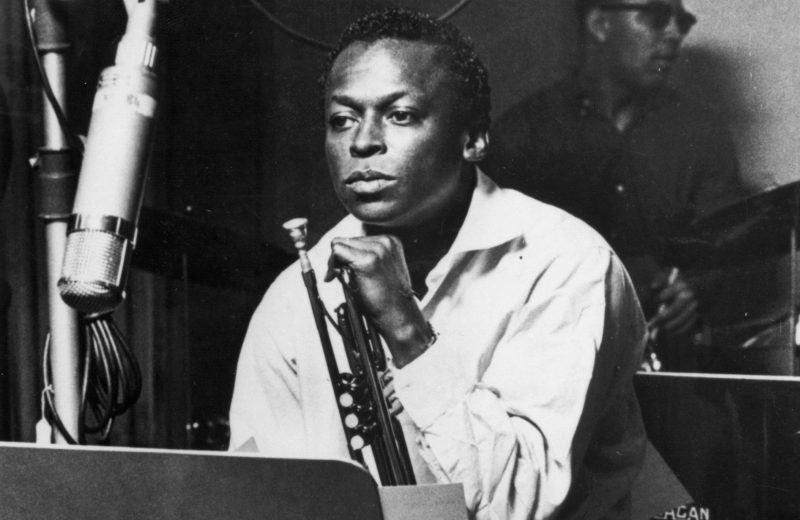The brains of Jazz and Classical musicians respond differently to surprising sounds
by Tom Jacobs
Central photo: Miles Davis, circa 1959. (Photo: Hulton Archive/Getty Images)
The way we mentally process the unexpected may be a key to creativity.
Can creativity be taught? Not directly, perhaps. But if such a curriculum exists, it would train one’s brain to regard unforeseen occurrences as potential springboards, rather than disturbing anomalies.
Fortunately, there is at least one type of specialized training that shapes neural activity in precisely that way. Its students aspire to be the next Miles, Mingus, or Monk.
In a new, small-scale study, a Wesleyan University research team led by Psyche Loui and Emily Przysinda report the brains of jazz musicians are uniquely attuned to surprising sounds. Electronic monitoring revealed these players have “markedly different neural sensitivity to unexpected musical stimuli,” the researchers write.
These musicians are trained not only to anticipate unpredictable turns, but also to engage with them in a positive, creative way. That dynamic reflex stimulates creative thinking.
The study, in the journal Brain and Cognition, featured 36 students from Wesleyan University and the Hartt School of Music. Twelve were studying jazz (including improvisation), 12 classical music, and the final 12 were non-musicians. The classical and jazz students all had at least five years of musical training.
While their brain activity was monitored, all listened to a series of chord progressions, which were “either of high, medium, or low expectation, as predicted by musical theory.” After each, the students indicated how much they liked or disliked it on a scale of one to four.
In addition, the participants completed a short version of a well-known creative thinking test, in which they were given six open-ended prompts such as “List all the uses you can think of for a paper clip” in three minutes. They were scored on both the number of items they came up with, and their originality (that is, how often each answer was also given by other students).
The musicians—jazz and classical alike—scored higher in originality than their non-musical peers. This finding provides more evidence that music training is beneficial to the brain in ways that extend far beyond the practice room.
The varied reactions to the chord progressions were telling. Not surprisingly, non-musicians strongly preferred the expected sounds. Classical musicians liked those in both the medium and high-expectation categories. And jazz players “were undifferentiated between the high and low expectation conditions.”
In other words, the young musical improvisers were uniquely receptive to unexpected sounds. Analysis of their neural activity provided confirmation of their self-reports: The sounds prompted their brains to produce a unique pattern of small voltages known as event-related potentials.
“The improvisatory and experimental nature of jazz training can encourage musicians to take notes and chords that are out of place, and use them as a pivot to transition to new tonal and musical ideas,” Loui and her colleagues write. “This could lead to the increased cognitive flexibility in jazz musicians.”
That makes sense. But while they aren’t asked to compose on the spot, classical musicians also are trained to deal with the unexpected—and they, too, outperformed non-musicians on the test of general creativity.
One very specific neural reaction (the P3b, for all you neuroscientists) was correlated with both general musical training and creative thinking on the standardized test. This suggests that, while learning how to improvise may have particularly powerful effects, creativity may be stimulated by the neural processing fostered by music study even in its absence.
Granted, it’s possible that people who decide to learn an instrument have brains that are pre-wired in a certain way, but previous research suggests that’s unlikely. Loui plans to study that issue, as well as whether other types of artistic training—say, improvisational theater—will yield similar results. Given the general consensus that the jobs of the future will require creative thinking, it’s an important line of research.
Perhaps music education can serve as a model for training the brain to respond creatively to roadblocks or surprises. As Miles Davis famously pointed out: “There are no wrong notes in jazz. It’s the note you play afterwards that makes it right or wrong.”
